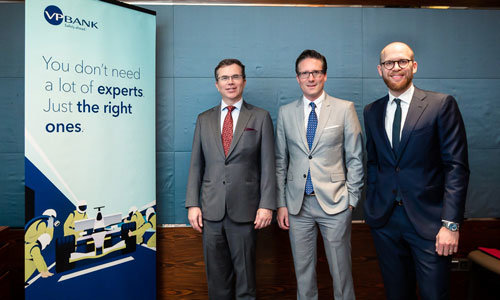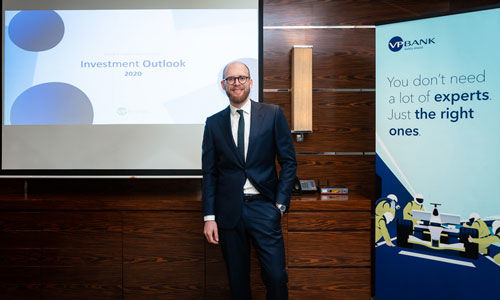Felix Brill: «Investors Should Prepare Themselves for the Imponderables»
Felix Brill, chief investment officer of VP Bank Group, outlines three scenarios for 2020 and examines their implications for the various asset classes.
By Felix Brill, Chief Investment Officer
The year 2020 will be dominated by numerous issues that can quickly develop in both positive and negative directions. It pays to be invested even if it is late in the economic cycle if you manage the portfolio risks well. A stellar investment year lies behind us. Nearly all asset classes posted gains, some quite substantial ones. On the contrary, the economy provided little support, with many of the fears that had led to a market correction at the end of 2018 becoming true.
Although a recession was avoided, the global economy has weakened significantly, especially in the industrial sector. Central banks helped many stock markets hit record highs when they made a U-turn in policies at the beginning of the year; instead of a normalization of monetary policy, a renewed easing had followed. This put bond yields under pressure, which led to price gains on the bond markets.
This Year Will Be No Less Eventful Than 2019
Recently, there have been signs that the economic slowdown is bottoming out. The global economy is hence expected to gain traction again in 2020.
At the turn of the year, there have been signs of political easing in at least two dossiers that affect the financial markets. Firstly, the recent U.K. elections can almost confirm the eventuality of Brexit. Secondly, developments in the Sino-American trade dispute has shown that it is increasingly likely that an initial deal between the two parties will be achieved.
However, underlying challenges remain, as the next stage of relations between the U.K. and the eurozone as well as the U.S. and China will see even more difficult negotiations. There are also other political events that could shape the financial markets in 2020, most notably the US presidential election in November. This may influence the outcome of the trade dispute, just as recent developments in Iran have altered the economic situation in the Middle East.
High Expectations

(Bruno Morel, CEO of VP Bank Singapore, Thomas Rupf, Head of Investment Advisory Asia, and Felix Brill
The turnaround in monetary policy by central banks has triggered a rally in riskier assets, demonstrating the influence that central banks are exerting on financial markets. Investors currently have great confidence in the central bankers, but this comes with high expectations.
At this point, there is little doubt that central banks are willing to support the markets. This, combined with the bottoming out of the economic slowdown, should ensure a stable market environment in 2020. However, a controversy over the effectiveness of additional monetary policy measures could well arise and turn some investors skeptical.
Good for the Economy
The year 2019 has shown that dissatisfaction with the political and economic order is growing. Issues include inequality in the distribution of wealth and income, and how central bank policies have made saving difficult and homeownership unattainable for many. Young people are also rising up and calling for a more sustainable way of living. Even prominent corporate leaders in the U.S. want to focus more on other stakeholders besides shareholders – a consideration that is good for the economy.
The year 2020 will, therefore, be dominated by numerous issues. All of the factors can quickly develop in a positive or negative direction. We have therefore put together three possible scenarios to guide portfolio positioning.
Base Case Scenario
- Economic reality helps to de-escalate international politics
- Economic growth stabilizes and might even improve in the course of 2020
- Central banks offer support
- Moderately higher returns and spreads
- Stock markets benefit from the better environment
Negative Scenario
- Failed trade negotiations lead to further political escalation
- Industrial weakness will infect other areas and will result in a recession
- Stimuli by central banks do not take enough effect anymore
- Markets will lose confidence
Out of the Box
- Inequalities are at a turning point
- Protests on social inequalities and climate change, negative impact on central bank policies, rethinking by managers, current economic weakness will lead to political change
- The fiscal stimulus for a Social & Green Deal
Last year is proof that it pays to be invested even when it is late in the economic cycle. VP Bank recommends the same for 2020 but advises investors not to fixate on any one of the three scenarios. The orientation of a portfolio should correspond to the basic scenario, in which there will be no recession but a slight recovery.
Hence, we continue to keep equities and bonds from solid debtors as core components in our investment strategy. We regard non-cyclical investments such as gold and insurance-linked securities as additional, important components for positioning in this current environment.
- Find more about VP Bank’s market analysis here.
Felix Brill, VP Bank Group’s Chief Investment Officer, is an economist and has worked in the financial sector for many years. Before he joined VP Bank in 2018, he was CEO of the consulting company Wellershoff & Partners and Head of Economic Research Switzerland at UBS Wealth Management Research. He studied economics at the Universities of St. Gallen and Bern as well as at the Stockholm School of Economics. He regularly gives guest lectures at ETH Zurich and the Swiss Finance Institute.
VP Bank LtdVP Bank was founded in 1956 and is one of the largest banks in Liechtenstein with 940 employees at mid-year 2019 (full-time equivalent 876). It currently has offices in Vaduz, Zurich, Luxembourg, Singapore, Hong Kong and Road Town on the British Virgin Islands. VP Bank Group offers bespoke asset management and investment consultancy for private individuals and intermediaries. As of 30 June 2019, the assets under management of VP Bank Group amounted to 45.6 billion Swiss francs. VP Bank is listed on the Swiss stock exchange SIX and has an «A» rating from Standard & Poor’s.
VP Bank Ltd Singapore Branch VP Bank Ltd Singapore Branch is a boutique private bank with a client-centric business philosophy and is the Asian branch of the Liechtenstein-based VP Bank Group with more than 70 employees. Established in 2008, VP Bank Ltd Singapore Branch provides specialized wealth management solutions and family office services for high-net-worth clients and professional asset managers. VP Bank Ltd Singapore Branch is dedicated to the protection and growth of clients’ wealth. The bank offers a holistic suite of services and advisory, not just in wealth management, but also in inheritance planning, structuring of trusts and foundations, as well as art and philanthropy. Apart from private wealth management, VP Bank Ltd Singapore Branch provides comprehensive services for asset managers and other financial intermediaries. The service offering comprises a trading platform, banking services including e-banking and mobile banking and operational support. Partnership arrangements with professionals include tailor-made investment advisory, discretionary management solutions, and custodian services.












